 Petzlover
PetzloverCircassian Orloff Wolfhound is originated from Russia but Gull Terr is originated from Pakistan. Circassian Orloff Wolfhound may grow 10 cm / 4 inches higher than Gull Terr. Both Circassian Orloff Wolfhound and Gull Terr are having almost same weight. Both Circassian Orloff Wolfhound and Gull Terr has same life span. Circassian Orloff Wolfhound may have more litter size than Gull Terr. Circassian Orloff Wolfhound requires Moderate Maintenance. But Gull Terr requires Low Maintenance
Very little is known of the history and development of the Circassian Orloff Wolfhound. It is suspected that it is related to the Hare Hound, Deerhound and the Greyhound. They were taken from Siberia to the Circassian southern mountains to hunt hare and small prey. The breed is also like the Borzoi but more intelligent and it is much faster than the other sighthounds.
The color and some other minor characteristics have evolved over the centuries to be different from the Siberian that was originally brought to the mountains. All the historical data suggests that the original parents of all these sighthounds was the Celtic Greyhound
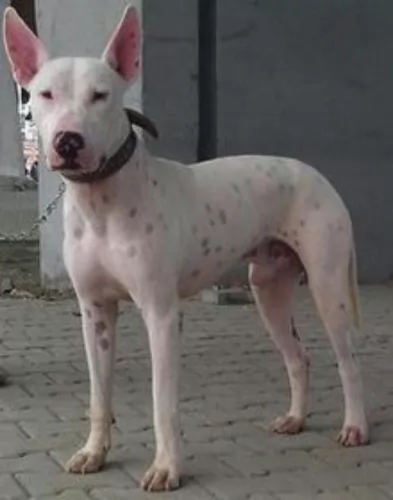 The Gull Terr hails from Pakistan. Having been introduced to the country by the British Raj, the dog has always been valued for its guarding and fighting abilities.
The Gull Terr hails from Pakistan. Having been introduced to the country by the British Raj, the dog has always been valued for its guarding and fighting abilities.
The British army, on bringing English Bull Terriers with them, mated them with local dogs. The dog was in other words, created from the old bull terrier which became extinct, and the Bully Kutta.
The Gull Terr or Pakistani Bull Terrier as he is known is a rare breed of dog. Today they are usually found in rural areas of Pakistan as well as in the Indian Panjab area, becoming popular as both pet and watchdog. It is no longer used for dog fighting as this has been banned.
The Circassian Orloff Wolfhound had many of the characteristics of any sighthound. He has strong straight legs and they are longer than most sighthounds which allows the Circassian to run amazingly fast. The head is long, the muzzle is wide, and the eyes are large and dark. They have a deep chest and medium tail. They also have a graceful and aristocratic demeanor.
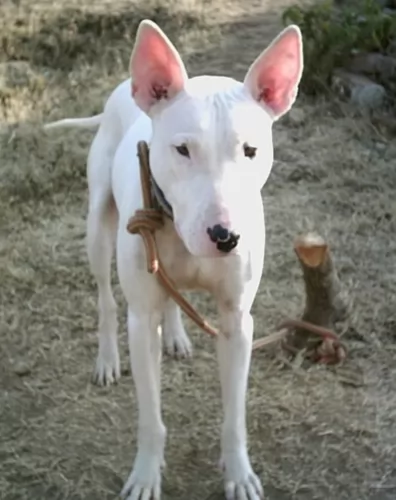 As a medium sized dog, the muscled Gull Terr stands as 45 – 66cm in height and weighs in the area of 40 – 45kg.
As a medium sized dog, the muscled Gull Terr stands as 45 – 66cm in height and weighs in the area of 40 – 45kg.
The dog has a short, smooth coat which is white, but you may find some black spots on him. He has a egg shaped head, ears are naturally erect, dark slanted eyes, and he has a long tail which is held upwards. Muscled and agile, he is a powerful working breed and makes a good watchdog.
This is an aggressive dog breed, and first-time dog owners might want to have a more amicable kind of pet to start off with.
He is a fearless dog, somewhat aggressive and suspicious towards strangers and therefore wants to protect his owner from them. With training and socialization he can be good with children in the home, although he is inclined to be boisterous and stubborn. He has fierce protective instincts, even though he is considered not as aggressive as some other Pakistani dog breeds.
The Gull Terr will need an experienced dog handler. Even though he has been a fighter in his day, he is capable of being an excellent family pet as well. You won't have trouble training him as he is intelligent. He then becomes more obedient and more manageable. He is a very active dog and therefore he won't fit into city dwelling where there are small spaces. He needs a place to run and on top of that he will require a good deal of exercise.
Fun and games are right in this breeds wheelhouse. They love to run. They need to run. Their activity level is very high, and they need lots of space and regular exercise. They are very intelligent and need mental stimulation as well. They are great at lure coursing and they love racing of course
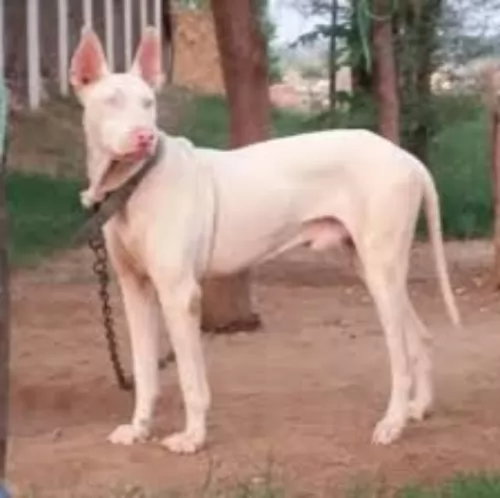 Your Gull Terr love the attention he receives from his human family and he won’t flourish at all if he is put into the back yard for watch dog purposes only. He is a dog that needs to come indoors to be with his family.
Your Gull Terr love the attention he receives from his human family and he won’t flourish at all if he is put into the back yard for watch dog purposes only. He is a dog that needs to come indoors to be with his family.
He tends to be somewhat aggressive and this is why he isn’t looked upon as the ideal pet for first-time dog owners and those with young children in the home.
He is a confrontational dog, willing to enter into a fight with provocation. Strong willed he will require early training and socialization, and when he is brought up by a firm, consistent, kind owner, he can get over his aggression and become a loyal, devoted, protective and loving pet.
Again, little is known about the health of this ancient breed, except to propose that it faces many of the same challenges as the Greyhound. This would include skin irritation, bloat, osteosarcoma and esophageal achalasia.
Esophageal achalasia is rare and affects the esophagus’ muscles. The upper muscles can’t relax and that causes the lower muscle or sphincter not to open and no food can get to the stomach.
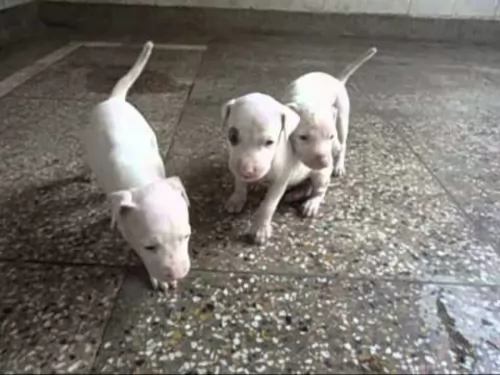 The Gull Terr has a deep chest and this means he is more prone to bloat, a condition known as gastric dilation volvulus.
The Gull Terr has a deep chest and this means he is more prone to bloat, a condition known as gastric dilation volvulus.
Your pet's stomach fills with air and this leads to decreased blood flow to vital organs. The stomach can twist and this is when the condition becomes life threatening as blood supply to the stomach is cut off. Instead of feeding him large meals, feed him smaller meals more frequently.
Deafness in your pet can be temporary or permanent, in one ear or both. There are are so many reasons why your pet could be deaf and it could be a birth defect, an infection or old age. Certain dogs such as the white coated Gull Terr are also more predisposed to congenital deafness.
Get him to the vet who will examine your dog’s ear canal for wax and debris and discuss the way to go for your beloved pet.
This dog is a lean running machine. Do not overfeed. It is also better to feed him two to three times a day in smaller portions rather than one large meal.
They tend to be allergic to insecticide and anesthesia. It’s best not to treat your yard for insects if your Circassian Orloff Wolfhound will be out in it.
Fun and games are right in this breeds wheelhouse. They love to run. They need to run. Their activity level is very high, and they need lots of space and regular exercise. They are very intelligent and need mental stimulation as well. They are great at lure coursing and they love racing of course.
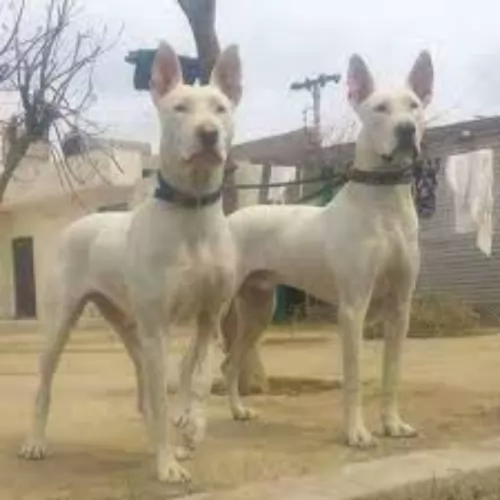 Easy to look after with his short coat, the Gull Terr will only require a brushing twice a week to keep the coat shiny and healthy.
Easy to look after with his short coat, the Gull Terr will only require a brushing twice a week to keep the coat shiny and healthy.
Because his coat is white, it can show dirt easily, and it will simply require taking a damp cloth and wiping the mark off him. You don't want to be bathing him often as this dries his skin out – rather just wipe the coat down.
Your Gull Terr is a highly energetic dog and he loves nothing more than to be involved in robust exercise and games. He is best suited in a home with large grounds and if you do opt to have him in the city, you will have to pay close attention to his exercise needs – lots of walks, runs, ball games, swimming and running with you as you cycle.
You want to be sure that your energetic Gull Terr has a healthy diet full of important proteins, fats, and carbohydrates.
Protein is always important for a dog like this and you want to make absolutely sure that apart from his high quality kibble, you mix in raw meat from time to time as well as cooked chicken, fish, brown rice and vegetables.
When looking for a commercially manufactured dog food, look for high-quality animal protein as a top ingredient. Make sure he always has fresh, cool water available to him.